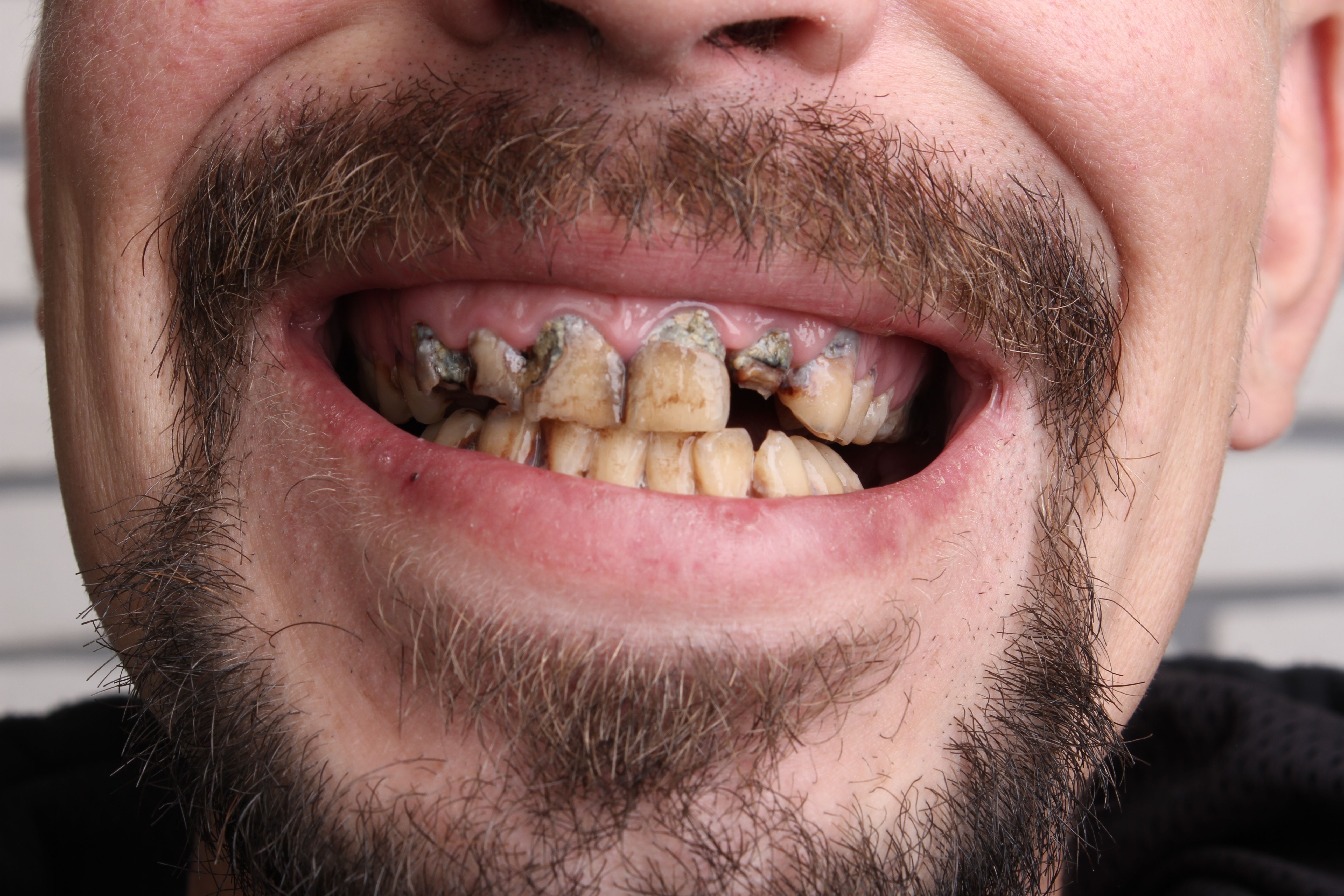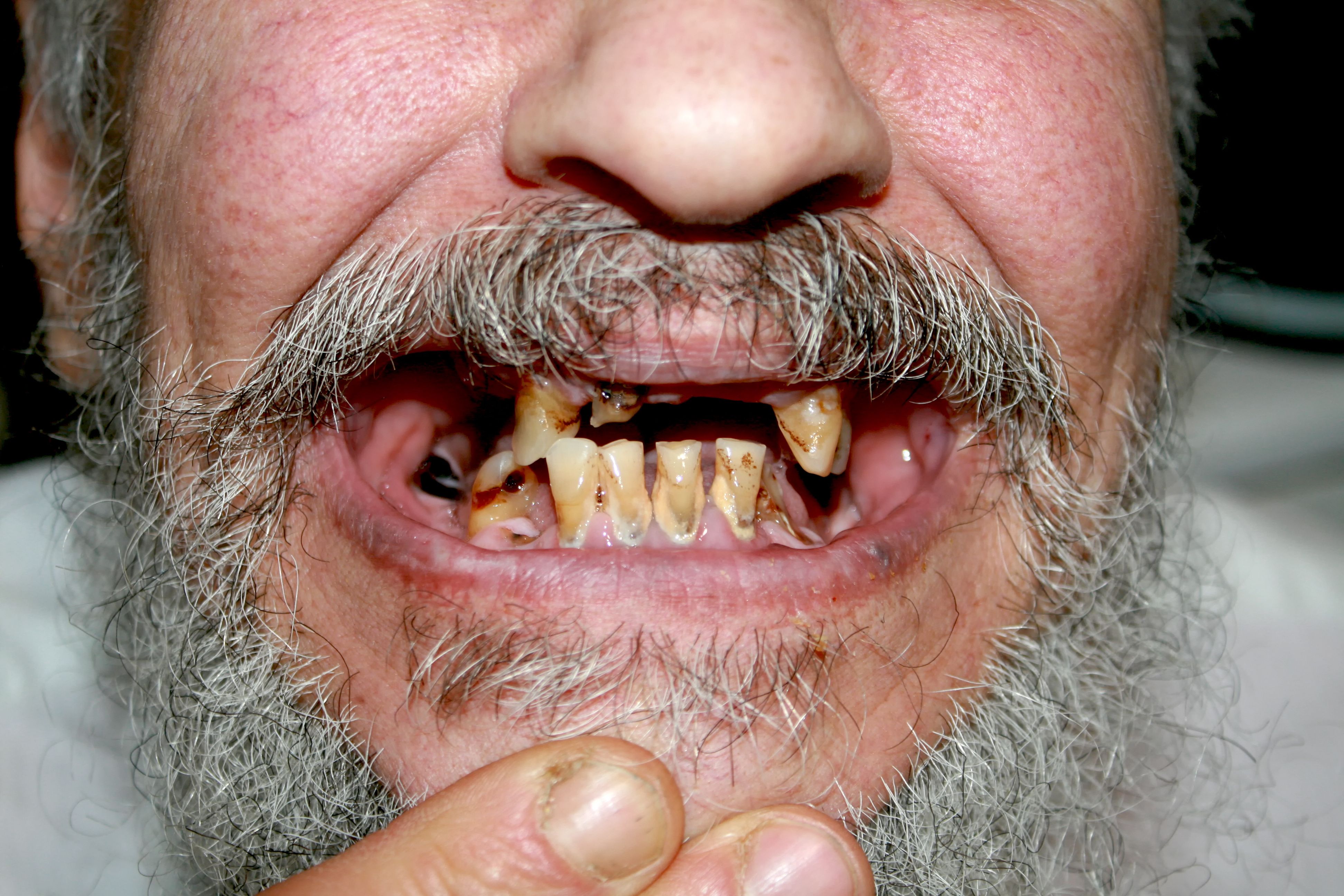What Is Meth Mouth & What Does It Look Like?


If you or a loved one is struggling with methamphetamine use, please contact SAMHSA’s National Helpline. It's a free, confidential, 24/7, 365-day-a-year treatment referral and information service for individuals and families facing mental and/or substance use disorders.
How Does Meth Affect The Body?
Methamphetamine, also known as meth, is a highly addictive stimulant drug that can have severe and harmful effects on the body. Some of the short-term effects of meth use include:
- Increased alertness and energy
- Decreased appetite
- Attention deficit hyperactivity disorder (ADHD)
- Euphoria
- Increased heart rate and blood pressure
- Irritability and anxiety
- Aggression
- Paranoia
Chronic users of meth can lead to a range of serious health problems, including:
- Addiction
- Cognitive impairment and memory loss
- Meth-related psychosis, including visual and auditory hallucinations, and delusions
- Severe dental problems, meth mouth
- Skin sores and infections
- Dramatic weight loss and malnutrition
- Body-focused repetitive behavioral disorder
- Increased risk of stroke and heart attack
- Increased risk of contracting blood-borne diseases, such as HIV and hepatitis, due to risky behaviors that may occur while under the influence of the drug
What Is Meth Mouth?
It’s normal for people to get cavities every now and then. But meth mouth is like cavities times 10. When meth users have meth mouth, or if you’ve seen meth mouth images on the internet, they usually have at least a dozen different teeth with large, dark cavities along the gumlines.
Meth mouth is basically a very aggressive case of rampant untreated tooth decay involving multiple teeth. Especially the ones at the front of the mouth (for some reason, the top ones tend to look the worst.) While most cavities aren’t visible to the naked eye, cases of meth mouth involve large black or brown patches that you can’t help but spot without even trying too hard. Without professional treatment and addiction recovery, it’s only a matter of time before these individuals lose most or all of their teeth.
How Does Meth Mouth Develop?
Over time, the excess plaque from not brushing, paired with the acidic sugars, causes severe levels of enamel erosion and decay along the gumlines and between each of the teeth. These cavities are typically easy to spot, as they tend to be brown and black and most severe along the gums on the front teeth.
Meth mouth is basically tooth enamel decay on overdrive. If you’ve seen meth mouth images, you know there’s nothing like it; it’s one of the worst things that can happen to your smile.
How Do Meth Sores Happen?
A lot of the sores in your mouth from meth use are a combination of infection from oral bacteria, poor hygiene, and hot temperatures (if you’re smoking crystal meth rather than injecting it.)
Think of it this way. Your mouth is filled with tons of bacteria. If your gums develop infections like gingivitis or gum disease because you aren’t brushing and flossing as you should—which is normal if you’re using meth—your oral mucosa (the skin in your mouth) is way more prone to developing mouth sores. Once the bleeding starts, those bacteria start to invade the tissues in that space, leading to recurring inflammation and delayed healing.
Many meth users said to “sweat” meth through the pores in their skin, which can lead to scratching and picking at sores, causing the substance use disorder to spiral out of control.
What Does Meth Mouth Look Like?
If you’ve seen meth mouth images on the internet, it’s usually because a dentist is taking before and after photos when they’re about to begin someone’s full mouth rehabilitation.
Since meth mouth is usually the result of poor oral hygiene combined with a high intake of sugary foods and drinks, decay typically runs rampant throughout the mouth. Addicts tend to be dark discolorations across all of the natural teeth, especially along the gumlines and the sides of the teeth at the front of the mouth. In some cases, teeth may be completely broken off at the gumline, leaving nothing more than a brown or black “nub” of tooth left in that place.
There’s not really any other condition that looks like meth mouth, so it’s fairly easy for other people to tell if someone has a methamphetamine addiction if their teeth look this way. That is, assuming they also fit other characteristics of someone using meth (like skin sores, mental health issues, difficulty keeping a job, or poor overall hygiene.)
Meth Mouth Images


People With Meth Mouth Also Get Skin Sores
Mouth sores can also be due to smoking crystal meth. The chemical, combined with hot temperatures, may lead to blisters and burns inside of the person’s mouth or along their lips.
Unfortunately, one of the reasons why so many people develop mouth sores and meth mouth is because of poor nutrition and inadequate hygiene. This creates the perfect storm for bacteria to take advantage of the situation, leading to a higher risk of infections across the body. If the person is “sweating” meth, it may lead to skin irritation which then triggers scratching and picking at their skin, making matters worse.
Meth Mouth Treatment And Addiction Counseling
The first step in treating meth mouth or meth teeth is addressing the meth addiction. The Substance Abuse and Mental Health Services Administration (SAMSHA) offers numerous helpful resources on its website for people looking for treatment for methamphetamine addiction, whether it’s for yourself or a concerned family member/friend.
Getting treatment for substance abuse of any kind may involve counseling, prescription drugs, and support groups with fellow recoverees.
After your addiction treatment begins, steps can be taken to address the side effects: your smile being one of them. Because dental erosion is typically severe for many recovering meth addicts, extensive restorative treatment is usually a must.
Talk With Your Dentist About Meth Abuse
It’s completely natural to feel embarrassed by your teeth or drug abuse. Trust me, dentists see it every day. Whether you’re recovering from an addiction, have battled an eating disorder, or even if you’re the victim of domestic abuse, your dentist can help you overhaul your smile so that you look and feel your best again.
Depending on the extent of tooth damage that’s present, your dentist might recommend a variety of restorations ranging from bonding and crowns to extractions and dentures. Your care plan will be customized to your specific needs and budget. In most cases, they’ll provide you with at least 2-3 options to pick from. Some may even do the work for free.
Overcoming Meth Addiction
If you or a loved one is recovering from a meth addiction or is a meth addict, there’s good news: your dentist can help you rehabilitate your smile to get you back on track to better health and nutrition. If your meth mouth is a serious case, they may need to extract some of the teeth. But sometimes, natural teeth can be restored with crown work. Your dental team will provide confidential treatment programs in a sensitive, caring atmosphere to help ensure you have access to the resources you need. There’s no judgment. Your dental team can—and will—help you through your recovery and provide the support you’re looking for.

Make your inbox smile!
Subscribe






